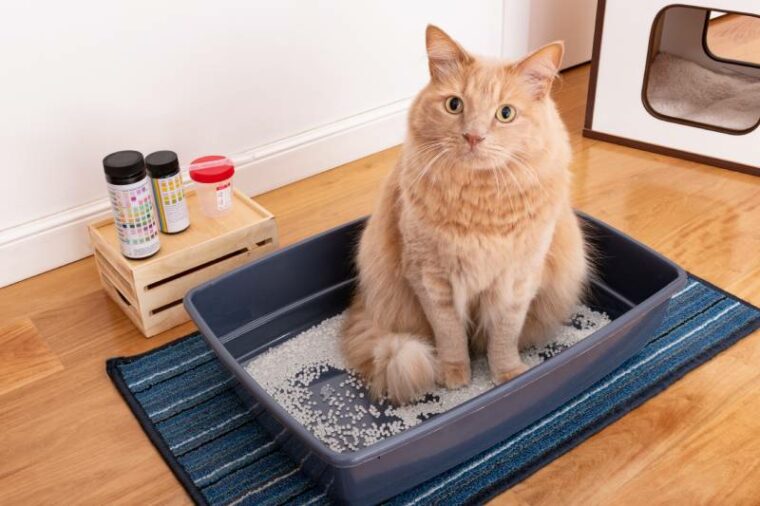
This article has been fact checked and reviewed by a qualified veterinarian using information available at the time of review. However, the purpose of this article is not to replace a veterinary examination and advice but rather provide a general guide to medical and behavioral conditions. Cat owners are urged to seek tailored advice for their pet from a veterinary professional. The views and opinions expressed in this article are those of the writer.
Using a litter tray is a peaceful and stress-free experience for a lot of cats. Others have occasional problems that need addressing. And then there are those cats that only seem happy when they are kicking litter around and making as much noise as possible while in the tray.
While some noise is to be expected, you should pay attention to your cat meowing or crying while using the tray. It could be a sign that they are in some sort of anguish. They could be stressed about something, or they could even be in physical pain or suffering some kind of condition or illness that needs addressing sooner rather than later.
Read on for more information on reasons your cat might meow while in the litter box.
The 10 Reasons Why Your Cat Is Meowing in the Litter Box
1. A Dirty Litter Box
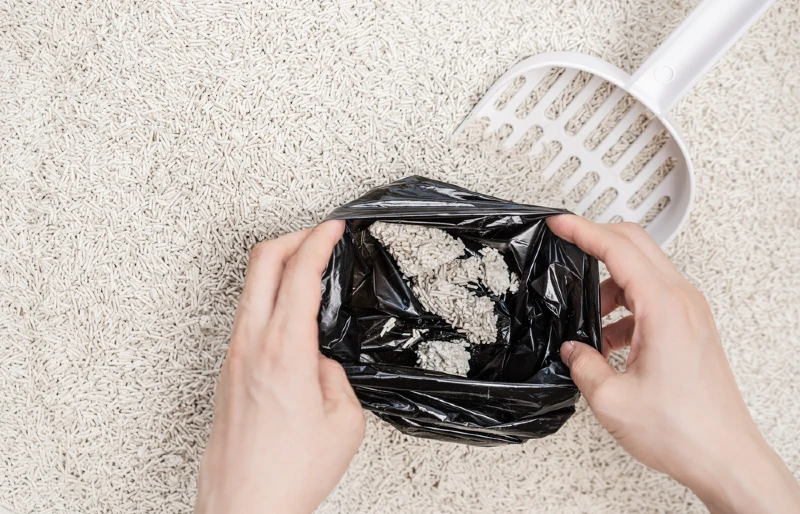
Cats are generally very clean animals. They groom themselves to keep clean and while the pile of litter outside the tray might suggest otherwise, they need a clean tray in order to feel comfortable and relaxed enough to do their business.
If you have a single cat, expect to spot-clean the trays once or twice a day, picking out solids and scooping up wet clumps. You should also completely replace the litter every week or so. Having enough litter trays will also help ensure that they remain clean, so you won’t have to clean them as often.
Cleaning up after our pets is hardly the most fun part of having them. Hepper's Advanced Bio-Enzyme Cat Litter Deodorizer can help to naturally break down odors in your litter box upon contact. It's fragrance-free, biodegradable, and safe to use around your pets.
At Pet Keen, we've admired Hepper for many years, and decided to take a controlling ownership interest so that we could benefit from the outstanding designs of this cool company!
2. An Inappropriate Litter Box
Cats, like most people, need to be comfortable to do their business. It is generally advised that a tray be at least one and a half times the length of your cat, from nose to bottom. This enables your cat to be able to move around, do its business, and then be able to comfortably scratch and cover everything up. If the litter tray is too small, it could be the cause of meowing in the litter box.
If you have recently changed the litter tray, it may be the case that your cat doesn’t like the new shape or design. It can take time for a cat to get used to using a covered litter tray, for example, and they may be meowing because they are reluctant to get it.
3. The Wrong Litter
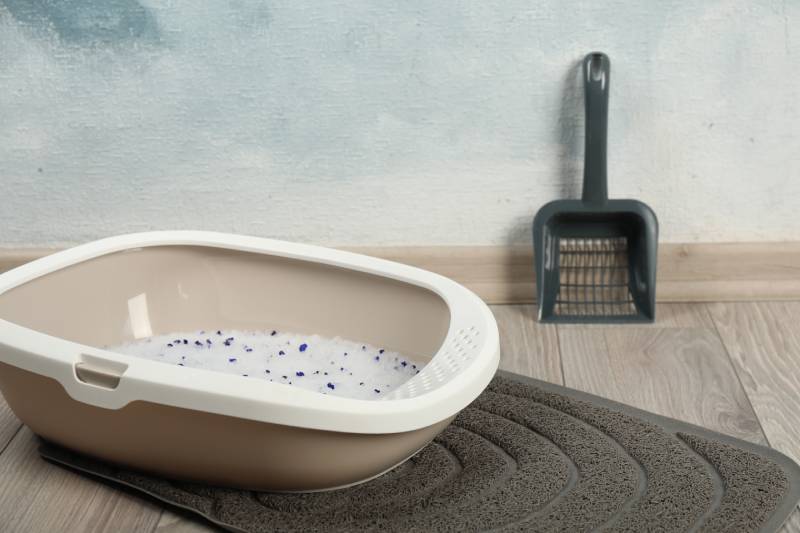
Similarly, if you have changed to a new litter, your cat may be voicing its disapproval of your choice, effectively asking you to bring back the old litter. This can be especially true if you move to a harder litter that is less comfortable when scratching around in it.
If possible, you should try changing the litter for one that is better suited to your cat and that they are happier using. You can try changing to a new litter gradually, by mixing a little of the new litter in with the old and gradually increasing the ratio until you are just using the new litter type.
4. Expecting a Reward
If your cat has only just finished litter training and you had to use positive reinforcement as a means to encourage the use of the tray, your young cat might be meowing because they are expecting a treat or reward for having successfully used the tray.
You should gradually wean your cat off the treats. Start by giving a treat every other time they use the tray. After a few days, you can offer treats every third time, and so on, until your cat doesn’t expect to be rewarded for successful tray use.
5. A Vocal Cat
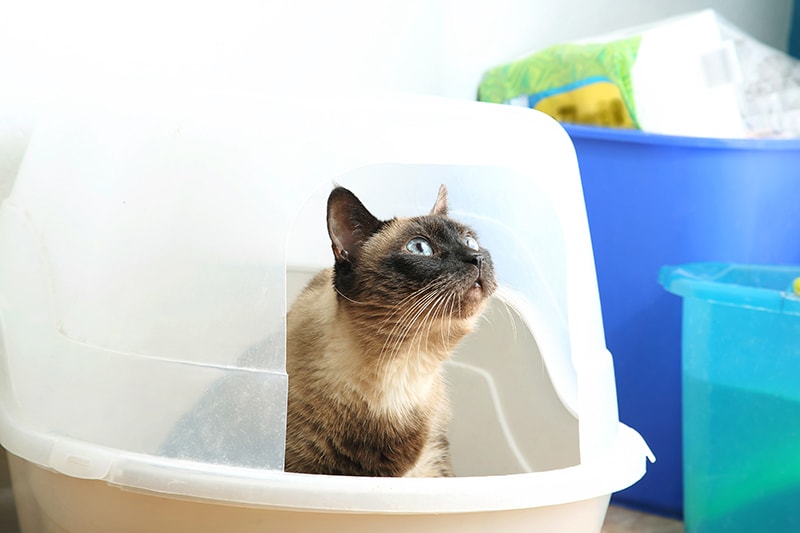
Although most cats will pee and poop quietly, this isn’t necessarily the case for all feline companions, and you may have one that likes to tell everybody when they are doing their business!
Make sure there are no other likely reasons for the vocalizations, and especially make sure your cat is not ill before you ignore the noise.
6. Inflammation
As well as behavioral causes of a cat meowing while using the litter tray, there are some possible health reasons. If your cat is crying in the litter box, this could be a sign of inflammation, especially of the bladder or urinary tract. This inflammation can be caused by infection, urinary crystals, or even by stress, and signs include crying in the litter box, blood in the urine or producing small amounts of urine.
If your cat appears to be in distress, their toilet habits have changed, and they are crying or meowing while using the litter tray, consult your vet.
7. Urinary Crystals

Urinary crystals, such as struvite crystals, are found naturally in cat urine, but they can become a problem if they form urinary calculi (stones). They can cause physical pain inside the urinary tract and may block the urinary tract.
Again, look for signs of pain as well as changes in toileting. If your cat is struggling to pee, they may spend more time in the litter tray because it will feel the need to wee more often.
8. Blockage
A blocked urethra is common in cats with urinary disease and most often affects male cats. It prevents the cat from being able to urinate at all. It is very painful, so most cats will cry and meow while in the litter tray trying to urinate, but in this case no urine is produced. Left untreated, this condition can cause kidney damage and life-threatening electrolyte imbalances, so your cat must be seen by a vet immediately.
9. Constipation
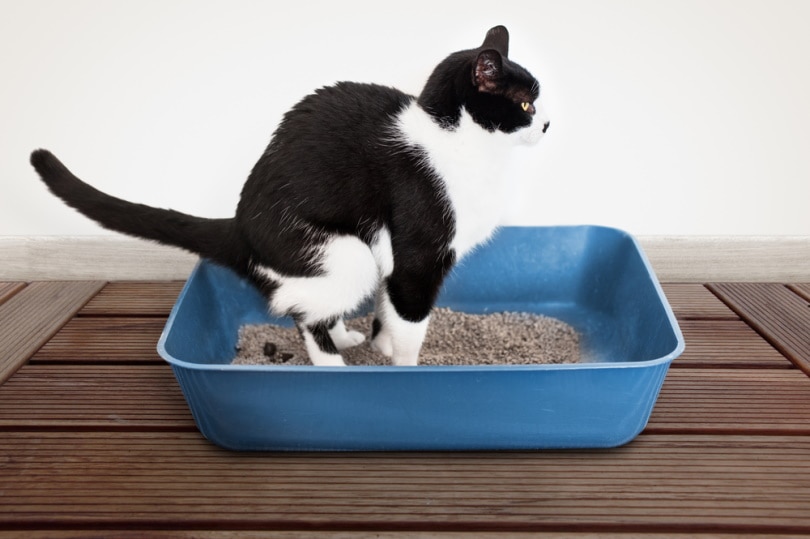
There are numerous causes of constipation, which is a problem with passing stools. Injuries, certain illnesses, dehydration and even physical conditions can cause constipation, and so too can a poor diet or ingesting objects like hair, bones, and cat litter.
Your vet may be able to give your cat something to help move everything along. You will need to take action to remedy the underlying problem that caused the constipation in the first place.
10. Arthritis
Even physical injuries or complaints like arthritis can cause meowing in the litter tray. It takes some effort to pee and poop, and it can require getting into an awkward position in the litter tray. If these movements lead to pain in affected joints, your cat’s natural reaction is to cry out or meow in anguish.
Other signs of arthritis include lameness or limping, mobility problems, general stiffness and crying and meowing when your cat jumps, runs, or even walks.
Conclusion
Some cats are naturally more vocal than others, and if your cat is meowing in the litter tray, it could potentially just be that yours is a noisy cat.
However, you shouldn’t simply dismiss the noise because this meowing can also be caused by serious illness and some physical conditions. Look for other signs of illness, such as a change in toileting habits and signs of physical pain and distress. If you’re in any doubt, speak to your vet, let them know the problem, and they will be able to advise the best course of action.
Featured Image Credit: Yaya Photos, Shutterstock









